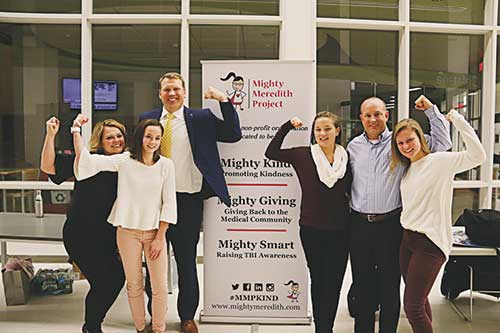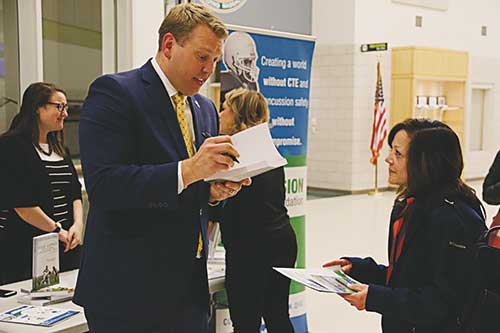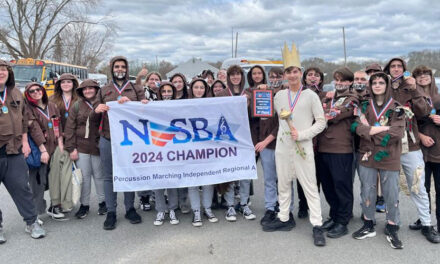Mighty Meredith Project hosts renowned expert
Published December 27, 2018
By MICHAEL GEOFFRION SCANNELL
NORTH READING — When local nonprofit the Mighty Meredith Project invited Dr. Chris Nowinski to town to conduct a special forum on concussions, they scored big.
Nowinski himself has had at least six concussions. The All-Ivy defensive tackle and former professional wrestler with World Wrestling Entertainment (WWE), who competed under the name “Chris Harvard,” now holds a Ph.D. from Boston University Medical School where he is co-founder and executive director of the Concussion Legacy Foundation.
He also authored the 2006 book “Head Games: Football’s Concussion Crisis,” which examined the long-term effects of head trauma among athletes.

THE CASEY FAMILY teamed up with renowned concussion expert Chris Nowinski, Ph.D., to raise awareness about traumatic brain injuries in a first of its kind event for the Mighty Meredith Project. From left, Karen Casey, MMP founder Meredith Casey, Nowinski, Catherine, Peter and Caroline Casey. (Al Pereira/Advanced Photo)
A Harvard alumnus who played football for the Crimson, Nowinski suffered from terrible headaches and experienced sleep problems after a concussion suffered in his 20s during his wrestling career.
Have you ever gotten hit so hard in a game that you saw stars? Then you’ve likely experienced a concussion, explained Nowinski, who pointed out that “dings” and “having your bell rung” are also euphemisms for concussion. Once he fully understood that fact he realized that not only had he suffered the major concussion while wrestling, but he had several others during his football and wrestling days.
In her introduction, Meredith Casey, 14, founder of the Mighty Meredith Project, said, “I guarantee you will walk away from this evening knowing one thing that you didn’t know before about concussion and traumatic brain injury.”
Nowinski referred to Casey at the beginning of his talk saying that they come from a similar experience and their injuries “really derailed the life they were going to have,” but said she had recovered better than many.
After his major concussion and numerous discussions with doctors he said, “I realized that I’d probably had six or more over the course of my time in contact sports.” Whether labeled dingers, bell ringers or seeing stars, he realized that most athletes didn’t know that those injuries were actually concussions.
One of his doctors pointed out that if he had rested after his concussions he probably wouldn’t be in this situation. He reacted with surprise. “Really? If I’d just taken a couple weeks off after these brain injuries, like I would have with any other injury, I would be okay?” His doctor said, “Yeah!”

CHRIS NOWINSKI, Ph.D., autographs his book, “Head Games: Football’s Concussion Crisis,” for fan Deanna Castro following his talk as the guest speaker of the Mighty Meredith Project. (Al Pereira/Advanced Photo)
Other doctors agreed that if he had taken time off from contact sports, as one would for any other injury, he would not have had the problems he was having. A concussion needs to be rested like any other injury.
Nowinski explained that what has frustrated him is that “this was new information that athletes didn’t know.” And that frustration has kept him passionate about educating the public on concussions.
“We now know concussions cause physical damage to the brain,” Nowinski said. He urges others to be vigilant in their observations when anyone gets a head injury. “If you see any signs of a concussion or they display any symptoms, get them to a medical professional. If you don’t have one there, that’s it – they’re done.”
The doctor contends that, “Nobody tells you that your brain doesn’t have pain nerves. That’s why you can’t feel your brain wobbling around in your head.” Nowinski went on to say, “You have to diagnose it from all these indirect symptoms.” Additional symptoms include not being able to think clearly, balance issues, or headaches after a head injury.
He stressed, “You’ve also just injured the part of your body that is supposed to tell you when you have an injury, so the idea of a child self-assessing their own injured brain is a little bit preposterous.” He described that as a losing strategy. Nowinski maintains asking them to tell you if they’re hurt “makes no sense because they’re not thinking straight.”
Nowinski explained, “We have very good data now which is mostly from the athletes that if you get off the field right away you’re going to recover much faster. If you go back in and try and tough your way through the game, your recovery doubles. That’s what the science is now saying.”
In terms of the current thinking on how long to keep a student out of sports after a concussion, the doctor said, “The original thinking used to be 24 hours. The current recommendation is two to three weeks.” He remarked that he thinks it’ll be four to five weeks in the near future. He emphasized at least keeping the student from participating in sports for as long as they would for an injured hamstring or a sprained ankle.
Bringing a nationally renowned speaker, such as Dr. Chris Nowinski, to NRHS was no small effort. Mighty Meredith Project’s namesake, Meredith Casey, said she first saw the doctor’s name on The Today Show and knew that she had to meet him.
After a series of phone calls and emails the meeting was arranged. According to Meredith, “As soon as I walked out of the first meeting with Chris and the Concussion Legacy Foundation I knew I had to bring him to North Reading to share his knowledge about concussions and their long term effects, the most prevalent of TBI’s to my peers.”
Meredith continued, “Although my injury is more extensive than a concussion, I suffer from many similar symptoms as anyone would with a concussion. I knew North Reading (residents), and anyone else that was willing to listen, had to hear what Dr. Nowinski had to say. I am proud of what we were able to accomplish.”
“Brain injuries are real and need to be taken as seriously as any injury you can see, such as a broken arm or sprained ankle,” added her mother, Karen Casey. “As we learned from Dr. Nowinski, if untreated, concussions have life-long impacts.”
Karen added that the feedback from the event has been overwhelmingly positive, with many people telling her that they’d wished more parents of kids who play contact sports had attended.
Over 200 people registered for the event which took place on December 4 at the Performing Arts Center of North Reading High School.
Among those in the audience were Superintendent of Schools Jon Bernard, Middle School Principal Cathy O’Connell, Batchelder School Principal Sean Killeen, who also serves as the NRHS girls’ soccer coach; state Rep. Brad Jones, medical practitioners, and a handful of teachers and coaches, as well as parents and student-athletes, who made up the majority of the audience.




